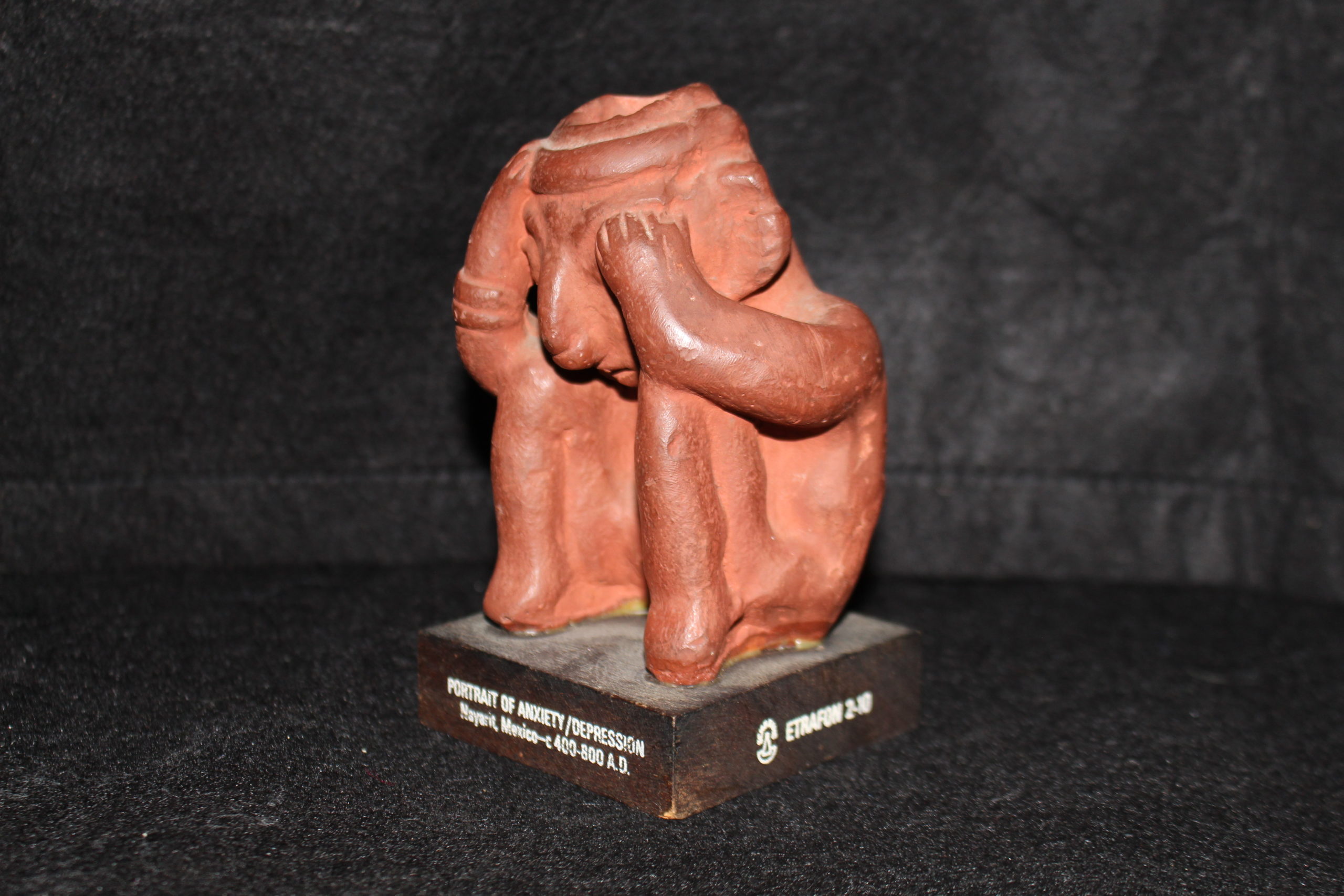Studies that compare the effectiveness of different antidepressants are unreliable, according to new research in BMC Psychiatry. Unblinding effects—when the researchers and participants can tell who is taking the active drug rather than the placebo—can bias the results.
The obvious immediate side effects of the older antidepressant drugs (e.g., amitriptyline and trazodone), such as drowsiness, dizziness, and dry mouth, made it obvious which participants in a drug trial were taking the drug, and which were taking the inert placebo. Because “depression” is a subjective phenomenological experience, it is very susceptible to bias. Clinicians who know that the patient is taking the placebo may interpret ambiguous statements as indicating a lack of improvement.
According to the researchers, this explains why the older antidepressants initially appeared highly effective in clinical trials.
“It is thus plausible that TCAs appeared highly effective because outcome-raters were able to break blind and hence to correctly guess who was on active treatment and who on inert placebo.”
Essentially, when the blind for a study is broken, the placebo appears much less effective.

Lisa Holper conducted the study at the University of Zurich and Michael P. Hengartner at the Zurich University of Applied Sciences. Holper and Hengartner used a Bayesian network meta-analysis to compare the placebo effect in studies of old tricyclic antidepressants (amitriptyline and trazodone) versus the placebo effect in studies of SSRIs, SNRIs, and other new types of antidepressants.
The adverse effects of newer antidepressants are more subjective and do not necessarily show up immediately, making it more challenging to break the blind of a study. According to the researchers, this should mean that the placebo is much more effective in newer studies—and that’s precisely what they found.
“The present exploratory NMA indicates that distinguishable side effects of older drugs may unblind outcome-assessors, thus resulting in an overestimation of the average drug-placebo difference,” they write.
“If confirmed in prospective studies, these findings suggest that efficacy rankings for antidepressants are susceptible to bias and should be considered unreliable or misleading.”
This result is consistent with previous research. One meta-analysis found that the placebo response was twice as high in 2005 as it was in 1980.
Interestingly, patient ratings of their own experience did not show this increase—it was only the clinician’s ratings that were biased by unblinded studies.
Similarly, a Cochrane review found that when active placebos (placebos with side effects) were used, the comparative efficacy of antidepressants diminished considerably.
Another review found that properly blinded trials showed antidepressants to be only about 25% as effective as they were found to be in unblinded trials, by clinician rating. That study also found that patients rated antidepressants no better than placebo.
Although Holper and Hengartner attempted to rule out changes in research trial methodology over time as a possible explanation (by accounting for study year), this may still be another explanation for why the placebo response was so much lower in the ‘70s and ‘80s. Additionally, their study should be considered exploratory and requires further confirmation. When their statistical methodology was changed, their results became less compelling.
****
Holper L & Hengartner, MP. (2020). Comparative efficacy of placebos in short-term antidepressant trials for major depression: A secondary meta-analysis of placebo-controlled trials. BMC Psychiatry, 20, 437. (Link)















Peter: If all life as being experienced has elements of subjectivity in the measure of the moment being experienced, whether one is becoming depressed or oscillating to the mirror state, then how does the Western Cultural values awaken to the deterministic value that can become destructive? Better yet, within the thinking and meditating, how or why can the healing space be experienced into a safer place on and off, even away the web? Discovering a better way to afford presence, would seem to be of value to our communities? And places we visit?
Report comment
The corporate clinical trials find about a 2 point change in the 54 point HAMD depression scale in the short term. This is before any adjustments to the half dozen or so design flaws that make the drugs appear better.
Here are some examples of what a 2 point change in the HAMD scale is.
-A person going from saying they are not ill to saying they are ill.
-If the person stops losing weight.
-The psychiatrist feels the person has stopped being preoccupied with health.
-The person is no longer playing with their hands or hair according to the psychiatrists opinion.
If informed consent occurred I wonder how many people would take a deadly addicting drug (Antidepressants increase death rates by similar amounts as an alcohol addiction) where the benefit was equivalent to, “I now say I am mentally defective and agree with the psychiatrist selling me drugs.”
Report comment
If you stop waking up in the middle of the night, you can get -2 points on the scale!
Report comment
And if your period ends and you stop having menstrual symptoms, you lose two points as well. Maybe Prozac stops your period!
Report comment
“If the person stops losing weight,” and/or if a person looses weight, upon the recommendation of a doctor, by exercising, rather than dieting.
Losing the weight I had gained when I was pregnant, was one of the reasons I was misdiagnosed by, child abuse covering up obsessed, psychologists and psychiatrists.
Thank you, Peter, for pointing out the fraud of psychiatry and psychology.
Report comment
A friend of mine, since having committed suicide, was actually held within an asylum, after being committed, because she still got up in the middle of the night and had a cigarette, but then went back to sleep.
This is serious criteria for determining someone’s mental health?
Another friend of mine, still alive but highly disabled by the system, and I would say showing severe symptoms of anosognosia because of the drugs she was forced on, they were going to keep her there longer because of her relationship with nature. She sees nature as being part of the Kingdom of Heaven, and so she entertains parts of it as representing her connection with people she has lost in her life. There was a crow or so that, during a time in the bleak courtyard and the asylum, the only plant life there having somehow sprouted up between the cracks in the concrete, but a crow flew near by, or another bird I don’t remember, and made a sound. My friend said that was her mother, I think it was her birthday even. That was overheard by someone working there, and they were going to keep her another week, at least. I called up there and let them have it, talking about persecution of indigenous religious beliefs: by some miracle this pundit of institutional conformity ( and by all means he was “nice” about it, as if saying they were just trying to make sure was assuring to anyone, when they hadn’t even asked her with any insight as to why she said that ) it seems he somehow got her let out the next day. She’s actually totally unaware of how much the drugs effect her, and thinks that she can just get off of them, when she wants to, but has no idea at all to be aware of the withdrawal symptoms, or how to deal with them; and since I’ve known her for more than 20 years has constantly gotten herself into trouble when she tries to get off of the drugs. Her whole family is also oblivious. Sadly she can be quite apologetic about the system, she has a trust fund and had an apartment big enough to take someone in, someone also in the mental health system, but when he started acting out, and she wanted him out of the apartment, instead of just asking him to leave or even trying to, she had him committed. Later she admitted that to do that you have to exaggerate and lie. Recently, having moved into a foster care facility, the lady in charge also told me how she’s able to work the system, and knew exactly what to say to get herself committed to the asylum, for petty reasons, which she has called a second nursery school. This 1000 dollars a day or so resort, that the government pays for, mostly. And she really was in trouble, given the withdrawal symptoms, and her anosognosia regarding the effect of the drugs; but going to the asylum isn’t going to help with such stuff. Recently, which is the past 5 or 6 years, she’s had herself committed, before that was forced.
But here with such petty things being used to determine whether someone is sick or not, what Willoweed brought up: how much is this really about turning off your mind when you have natural responses to a non working society, or distress regarding said non working society you won’t get points for bringing up, or that might start seeing that there’s something more worth it to invest in, involving thought, beyond the boundaries one is supposed to keep to be considered responsible!?
And 1000 dollars a day in an asylum, and you’re let out when…
When you agree that you’re sick, because the psychiatrist doesn’t like you playing with your hair, can’t tolerate you disagreeing with him when he’d have to listen to your side of the story, and have empathy…
Who knows what…
The friend of mine who committed suicide (who actually at one point had the same guy committed she had taken in, as the other had, come to think of it) just prior, I think the last time I visited with her, she showed me how she couldn’t sit still, how her hands would start shaking, and told me how the psychiatrist at the asylum had said to her that if she didn’t willingly start taking this, that, and then another drugs (or at least two, but I think at least three, I don’t remember exactly) that he wasn’t going to let her out. And he was aggressive and threatening.
Who is determining this stuff!? And statistically THEY are the ones whose “treatment” correlates with the spike in mental illness, AND with the violence associated with people who are supposed to be forced on this treatment, which is the PR spin. Like the Reichstag incident with Hitler; make people think they are being attacked (and cause that attack yourself, or do and say it’s the enemy) and you can control them. And then more disability, loss of life, loss of life expectancy, withdrawal symptoms, side effects, societal paranoia, loss of self initiative, more cost to everyone but the drug companies and those investing in their bonds and stocks.
It really doesn’t make sense, and the article above points out that when you take them out of the picture, that there isn’t really any correlation with anti-depressants helping depression.
Report comment